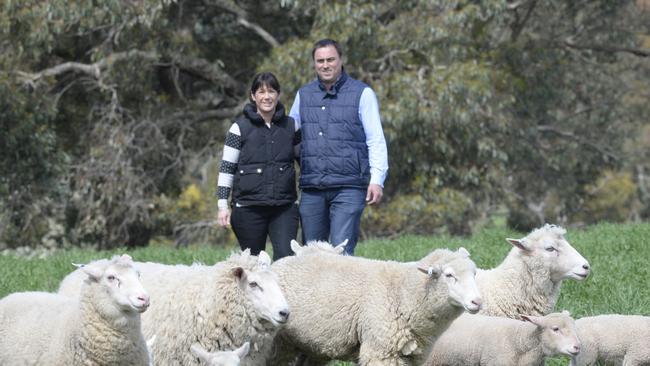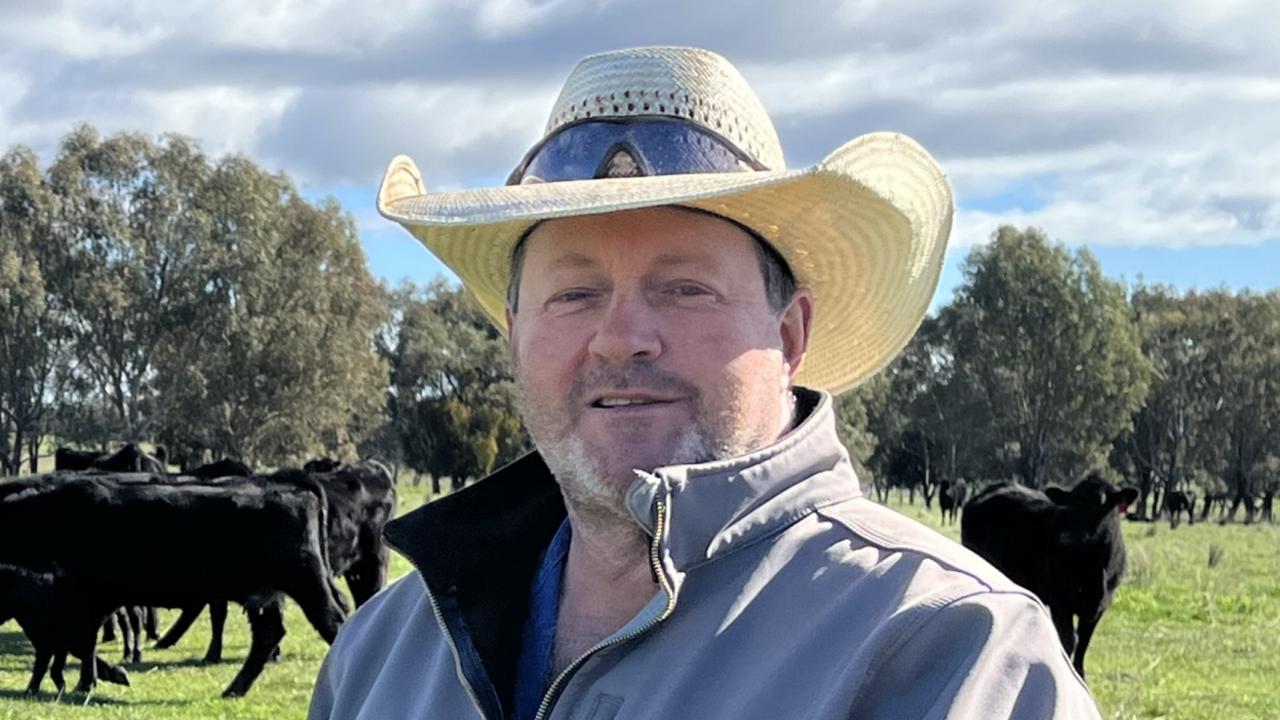Katherine and Tim Pilkington of Benview Farms are on a ewe-beaut search
INNOVATIVE couple Katherine and Tim Pilkington are on a tasteful quest to breed the best lambs, writes SARAH HUDSON.

FOR nearly two years Katherine and Tim Pilkington searched for the holy grail of sheep genetics.
The search started by examining traits of all meat sheep, then drilling down to specialists – talking to genetic providers and breeders – followed by abattoirs and then taste testing meat cuts with chefs, family and friends to see which meat was deemed the best.
“We started with an end goal in mind – we wanted premium-eating quality lamb, juicy, tender and full of flavour,” said Katherine, whose family works in the food industry in Melbourne.
“We wanted to do something above and beyond sending lambs to market.”
After this exhaustive search they decided to dedicate their flock to the composite breed, starting with ewes and rams from various studs around Victoria.
Launching their Benview Farms brand earlier this year, they now have a flock of 500 ewes, managed across three properties totalling 526ha around Beaufort and Dunneworthy in western Victoria, aiming to increase the flock to 1200 within three years and extend to export markets.
The majority of lambs are slaughtered – about 20 per week – at Hardwicks abattoir in Kyneton at 18-25kg carcass weight and sold through Benview Farms label to butchers, restaurants, and farmers markets, as well as home deliveries within 100km of their Ballarat home.
A small amount are sold through the Ballarat saleyards.
CHOPS AND CROPS
THE sheep are run alongside 190ha of crops, generally two crops a year of wheat (yielding on average 5 tonnes/ha), oats (3 tonnes/ha), lupin (2.5 tonnes/ha) or canola (1.5 tonnes/ha). Tim, who works fulltime as an agronomist, said if the sheep continued to be as successful he would one day stop cropping.
“If it continues the way we’re going, the crops will disappear,” said Tim, 38. “We extract value out of the sheep and have full control of it whereas with the cropping there’s timing and logistic issues to manage.”
Tim said by starting the Benview Farms composite sheep flock from scratch – after buying their Dunneworthy property in 2009 – they honed breeding values based on consumer requirements and by speaking to such industry experts as pioneer Andrew Michael at Leahcim stud in South Australia.
In this way they are not loyal to one stud, or a specific genetic line, but buy according to breeding values, specifically looking for meat yield, size of lambs (“the bigger the better”) and eating quality.
“Usually farmers who value-add their meat have their own flock and they need to push through those lambs, whereas our point of difference, our strength, is establishing an end-product and working backwards.”
LEAN MACHINE
TIM said Australian sheepmeat in the last 20 years had focused on being lean, “but there’s a negative correlation between lean meat yield and eating quality”.
“In beef, particularly Wagyu, the intermuscular fat ensures it’s good eating quality, juicy and full of flavour,” said Tim, who grew up on a cropping and livestock property in South Australia and later Swan Hill and studied agricultural science at Charles Sturt University.
“So we look for sheep that provide intermuscular fat. Not too much fat, but you need some.
“A small group of sheep producers understand this and are working down this track.”
Tim said they need year-round supply for their brand, although composites were a European and cycle according to lengths of days, between December and June.
As such the flock has a split joining in January and then March-April, he said, adding that “we’d love to be able to mate in November, but can’t”.
Given the Pilkingtons farm across three different properties – from clay loam to quartz gravel and sandy soil, receiving an average annual rainfall of 550mm – the flock feeds on varied pastures.
They renovate about 50ha per year of ryegrass, as well as oats, rape and in summer the flock feeds on crop stubble.
Tim uses zero-till methods on crops, never burning the stubble, and uses Precision Agriculture pH and phosphorous mapping to target nutrient applications on paddocks. “We are sustainable in that we don’t over-apply or under-apply nutrients, we give it what it needs and when it needs it,” he said.
“Sustainability is all about making sure you look after what you’ve got and leaving it better than how you found it.”
STOCK TAKE
ON AVERAGE the Pilkingtons stock 12 dry sheep equivalents per hectare.
Depending on the season, they give supplementary feed pellets to ewes and lambs.
Tim said they feed according to meat demand, aiming to hold some lambs to ensure year-round supply.
For that reason lambs are aged between 18 weeks and nine months when they are processed, aiming for 18-25kg carcass weight.
Benview Farms Meat – which recently won a bronze in the Australian Food Awards for branded lamb – is hung for five days to improve tenderness.
“Because stress impacts eating quality, we ensure low stress for the flock by not using dogs and getting them used to humans and being transported,” added Katherine, 36, who studied agricultural science at Dookie, graduating in 2002.
“The Benview Farms brand is quickly becoming the driving force of the farm because we can see huge growth potential.
“Consumers want to know where their food is coming from, they want to support farmers and want premium-quality eating. We feel like we are on to something exciting.”


